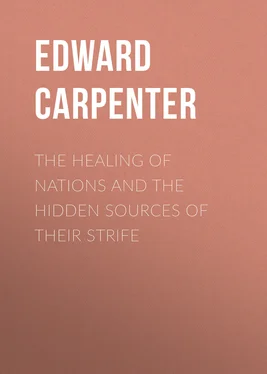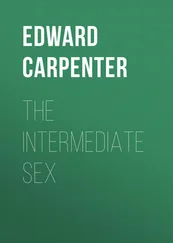Edward Carpenter - The Healing of Nations and the Hidden Sources of Their Strife
Здесь есть возможность читать онлайн «Edward Carpenter - The Healing of Nations and the Hidden Sources of Their Strife» — ознакомительный отрывок электронной книги совершенно бесплатно, а после прочтения отрывка купить полную версию. В некоторых случаях можно слушать аудио, скачать через торрент в формате fb2 и присутствует краткое содержание. Жанр: foreign_prose, История, foreign_edu, foreign_antique, на английском языке. Описание произведения, (предисловие) а так же отзывы посетителей доступны на портале библиотеки ЛибКат.
- Название:The Healing of Nations and the Hidden Sources of Their Strife
- Автор:
- Жанр:
- Год:неизвестен
- ISBN:нет данных
- Рейтинг книги:4 / 5. Голосов: 1
-
Избранное:Добавить в избранное
- Отзывы:
-
Ваша оценка:
- 80
- 1
- 2
- 3
- 4
- 5
The Healing of Nations and the Hidden Sources of Their Strife: краткое содержание, описание и аннотация
Предлагаем к чтению аннотацию, описание, краткое содержание или предисловие (зависит от того, что написал сам автор книги «The Healing of Nations and the Hidden Sources of Their Strife»). Если вы не нашли необходимую информацию о книге — напишите в комментариях, мы постараемся отыскать её.
The Healing of Nations and the Hidden Sources of Their Strife — читать онлайн ознакомительный отрывок
Ниже представлен текст книги, разбитый по страницам. Система сохранения места последней прочитанной страницы, позволяет с удобством читать онлайн бесплатно книгу «The Healing of Nations and the Hidden Sources of Their Strife», без необходимости каждый раз заново искать на чём Вы остановились. Поставьте закладку, и сможете в любой момент перейти на страницу, на которой закончили чтение.
Интервал:
Закладка:
Edward Carpenter
The Healing of Nations and the Hidden Sources of Their Strife
I
INTRODUCTORY
The following Studies and Notes, made during the earlier period of the present war and now collected together for publication, do not—as will be evident to the reader—pretend to any sort of completeness in their embrace of the subject, or finality in its presentation. Rather they are scattered thoughts suggested by the large and tangled drama which we are witnessing; and I am sufficiently conscious that their expression involves contradictions as well as repetitions.
The truth is that affairs of this kind—like all the great issues of human life, Love, Politics, Religion, and so forth, do not, at their best, admit of final dispatch in definite views and phrases. They are too vast and complex for that. It is, indeed, quite probable that such things cannot be adequately represented or put before the human mind without logical inconsistencies and contradictions. But (perhaps for that very reason) they are the subjects of the most violent and dogmatic differences of opinion. Nothing people quarrel about more bitterly than Politics—unless it be Religion: both being subjects of which all that one can really say for certain is—that nobody understands them.
When, as in the present war, a dozen or more nations enter into conflict and hurl at each other accusations of the angriest sort (often quite genuinely made and yet absolutely irreconcilable one with another), and when on the top of that scores and hundreds of writers profess to explain the resulting situation in a few brief phrases (but unfortunately their explanations are all different), and calmly affix the blame on "Russia" or "Germany" or "France" or "England"—just as if these names represented certain responsible individuals, supposed for the purposes of the argument to be of very wily and far-scheming disposition—whereas it is perfectly well known that they really represent most complex whirlpools of political forces, in which the merest accidents (as whether two members of a Cabinet have quarrelled, or an Ambassador's dinner has disagreed with him) may result in a long and fatal train of consequences—it becomes obvious that all so-called "explanations" (though it may be right that they should be attempted) fall infinitely short, of the reality. 1 1 Some people take great pleasure in analysing White Books and Grey Books and Orange Books and Yellow Books without end, and proving this or that from them—as of course out of such a mass of material they can easily do, according to their fancy. But when one remembers that almost all the documents in these books have been written with a view to their later publication; and when one remembers also that, however incompetent diplomatists as a class may be, no one supposes them to be such fools as to entrust their most important ententes and understandings with each other to printed records—why, one comes to the conclusion that the analysis of all these State papers is not a very profitable occupation.
Feeling thus the impossibility of dealing at all adequately with the present situation, I have preferred to take here and there just an aspect of it for consideration, with a view especially to the differences between Germany and England. I have thought that instead of spending time over recriminations one might be on safer ground by trying to get at the root-causes of this war (and other wars), thus making one's conclusions to some degree independent of a multitude of details and accidents, most of which must for ever remain unknown to us.
There are in general four rather well-marked species of wars—Religious wars, Race wars, wars of Ambition and Conquest, and wars of Acquisition and Profit—though in any particular case the four species may be more or less mingled. The religious and the race motives often go together; but in modern times on the whole (and happily) the religious motive is not so very dominant. Wars of race, of ambition, and of acquisition are, however, still common enough. Yet it is noticeable, as I frequently have occasion to remark in the following papers, that it only very rarely happens that any of these wars are started or set in motion by the mass-peoples themselves. The mass-peoples, at any rate of the more modern nations, are quiescent, peaceable, and disinclined for strife. Why, then, do wars occur? It is because the urge to war comes, not from the masses of a nation but from certain classes within it. In every nation, since the dawn of history, there have been found, beside the toiling masses, three great main cliques or classes, the Religious, the Military, and the Commercial. It was so in far-back ancient India; it is so now. Each of these classes endeavours in its turn—as one might expect—to become the ruling class and to run the government of the nation. The governments of the nations thus become class-governments. And it is one or another of these classes that for reasons of its own, alone or in combination with another class, foments war and sets it going.
In saying this I do not by any means wish to say anything against the mere existence of Class, in itself. In a sense that is a perfectly natural thing. There are different divisions of human activity, and it is quite natural that those individuals whose temperament calls them to a certain activity—literary or religious or mercantile or military or what not—should range themselves together in a caste or class; just as the different functions of the human body range themselves in definite organs. And such grouping in classes may be perfectly healthy provided the class so created subordinates itself to the welfare of the Nation . But if the class does not subordinate itself to the general welfare, if it pursues its own ends, usurps governmental power, and dominates the nation for its own uses—if it becomes parasitical, in fact—then it and the nation inevitably become diseased; as inevitably as the human body becomes diseased when its organs, instead of supplying the body's needs, become the tyrants and parasites of the whole system.
It is this Class-disease which in the main drags the nations into the horrors and follies of war. And the horrors and follies of war are the working out and expulsion on the surface of evils which have long been festering within. How many times in the history of "civilization" has a bigoted religious clique, or a swollen-headed military clique, or a greedy commercial gang—caring not one jot for the welfare of the people committed to its charge—dragged them into a senseless and ruinous war for the satisfaction of its own supposed interests! It is here and in this direction (which searches deeper than the mere weighing and balancing of Foreign policies and Diplomacies) that we must look for the "explanation" of the wars of to-day.
And even race wars—which at first sight seem to have little to do with the Class trouble—illustrate the truth of my contention. For they almost always arise from the hatred generated in a nation by an alien class establishing itself in the midst of that nation—establishing itself, maybe, as a governmental or dominant class (generally a military or landlord clique) or maybe as a parasitical or competing class (as in the case of the Jews in Europe and the Japanese in America and so forth). They arise, like all other wars, from the existence of a class within the nation which is not really in accord with the people of that nation, but is pursuing its own interests apart from theirs. In the second of the following papers, "The Roots of the Great War," I have drawn attention to the influence of the military and commercial classes, especially in Germany, and the way in which their policy, coming into conflict with a similar policy in the other Western nations, has inevitably led to the present embroilment. In Eastern Europe similar causes are at work, but there the race elements—and even the religious—constitute a more important factor in the problem.
Читать дальшеИнтервал:
Закладка:
Похожие книги на «The Healing of Nations and the Hidden Sources of Their Strife»
Представляем Вашему вниманию похожие книги на «The Healing of Nations and the Hidden Sources of Their Strife» списком для выбора. Мы отобрали схожую по названию и смыслу литературу в надежде предоставить читателям больше вариантов отыскать новые, интересные, ещё непрочитанные произведения.
Обсуждение, отзывы о книге «The Healing of Nations and the Hidden Sources of Their Strife» и просто собственные мнения читателей. Оставьте ваши комментарии, напишите, что Вы думаете о произведении, его смысле или главных героях. Укажите что конкретно понравилось, а что нет, и почему Вы так считаете.












